Home
Communio Sanctorum: The Church as the Communion of Saints
Loading Inventory...
Barnes and Noble
Communio Sanctorum: The Church as the Communion of Saints
Current price: $16.95


Barnes and Noble
Communio Sanctorum: The Church as the Communion of Saints
Current price: $16.95
Loading Inventory...
Size: OS
*Product Information may vary - to confirm product availability, pricing, and additional information please contact Barnes and Noble
Communio Sanctorum
is the most recent product of the Lutheran-Catholic dialogue in Germany and the first major Lutheran-Catholic ecumenical statement since the ground-breaking
Joint Declaration on the Doctrine of Justification
. It focuses on the ecclesiastical issues that the
Joint Declaration
identified as the remaining obstacles to Lutheran-Catholic communion. It describes the church as the communion of saints and then uses that description as a framework for addressing some of the most ecumenical issues: sacraments, ministry, the role of the church in salvation, and papacy.
While not claiming to have finally settled such difficult issues
does represent a new convergence on these questions. Uniquely, the dialogue then uses this understanding of the communion of the saints to address issues related to the communion that transcends death: the nature of eternal life, prayers for the dead, veneration of the saints and Mary.
has sparked vigorous debate in Germany and makes a major contribution both to Lutheran-Catholic dialogue and to the wider ecumenical enterprise.
is the most recent product of the Lutheran-Catholic dialogue in Germany and the first major Lutheran-Catholic ecumenical statement since the ground-breaking
Joint Declaration on the Doctrine of Justification
. It focuses on the ecclesiastical issues that the
Joint Declaration
identified as the remaining obstacles to Lutheran-Catholic communion. It describes the church as the communion of saints and then uses that description as a framework for addressing some of the most ecumenical issues: sacraments, ministry, the role of the church in salvation, and papacy.
While not claiming to have finally settled such difficult issues
does represent a new convergence on these questions. Uniquely, the dialogue then uses this understanding of the communion of the saints to address issues related to the communion that transcends death: the nature of eternal life, prayers for the dead, veneration of the saints and Mary.
has sparked vigorous debate in Germany and makes a major contribution both to Lutheran-Catholic dialogue and to the wider ecumenical enterprise.


















